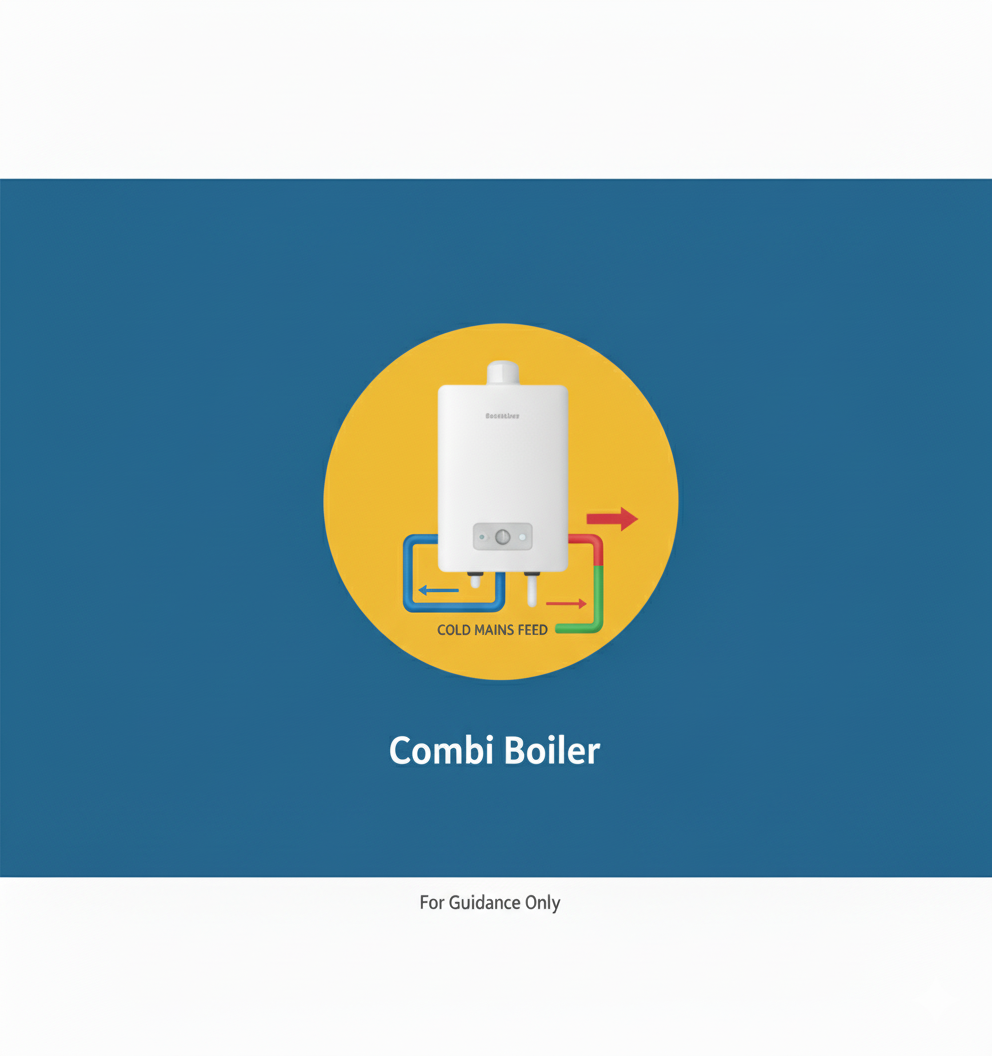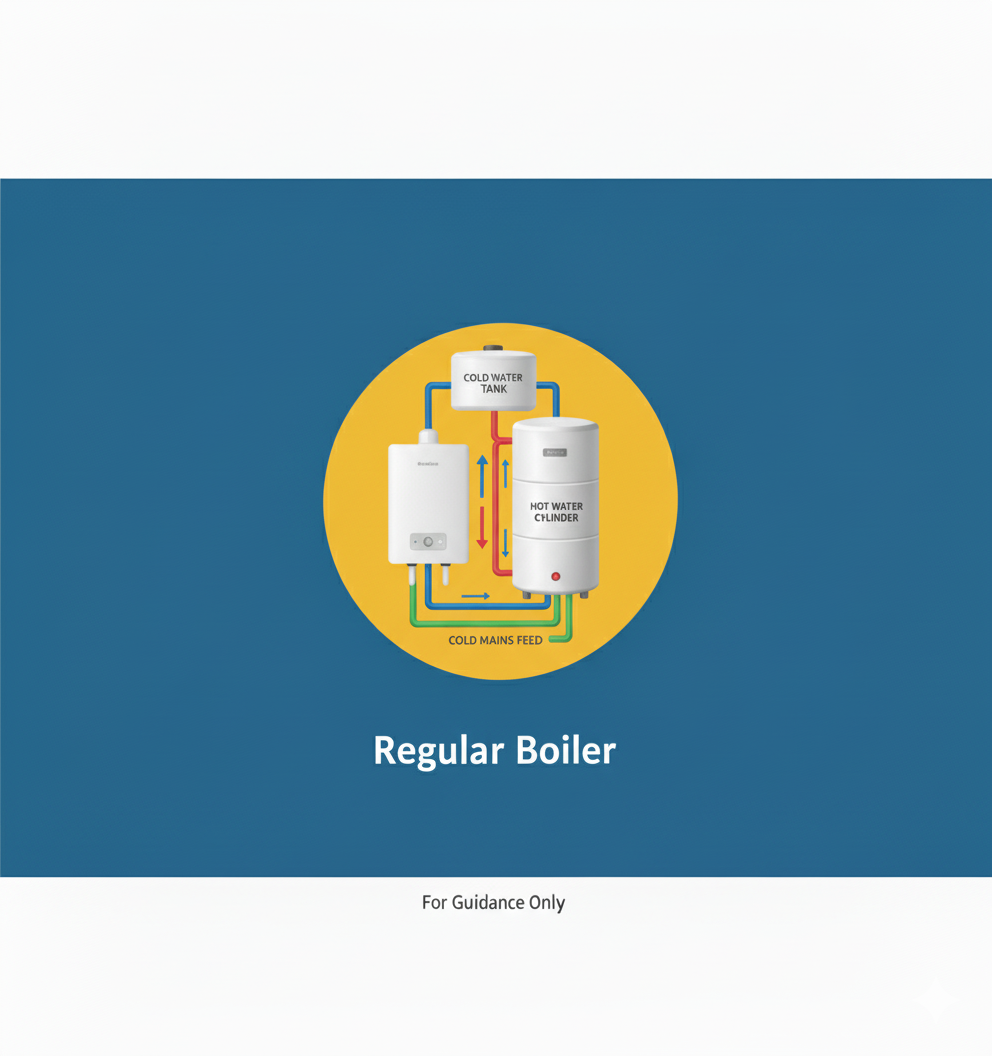Combination Boiler vs Regular (Conventional) Boiler
Compare these two popular boiler types to find which suits your home best
Combination Boiler

All-in-one boiler providing heating and hot water on demand without the need for separate tanks or cylinders.
Regular (Conventional) Boiler

Traditional boiler requiring both a hot water cylinder and cold water storage tank.
Key Statistics
Advantages Comparison
Combination Boiler Advantages
Space-saving design
No need for separate hot water cylinder or cold water tank, freeing up valuable cupboard space.
Instant hot water
Hot water is heated on demand, so you never run out and don't waste energy heating a tank.
Lower installation costs
Simpler installation with fewer components means lower upfront costs.
Energy efficient
Only heats water when needed, reducing energy waste.
Good water pressure
Water comes directly from the mains, providing strong pressure.
Cheaper to run
No heat loss from storing hot water, making running costs lower.
Regular (Conventional) Boiler Advantages
Works with low water pressure
Ideal for areas with poor mains water pressure as it uses gravity feed.
Simultaneous hot water to many taps
Can supply multiple bathrooms at once from the stored hot water.
Compatible with older systems
Works with existing pipework and radiators in older properties.
Immersion heater backup
Hot water cylinder can have an immersion heater as emergency backup.
High hot water volume
Large cylinder can store significant amounts of hot water for high demand.
Disadvantages Comparison
Combination Boiler Disadvantages
Limited hot water flow rate
Water flow reduces if multiple taps are used simultaneously.
Not ideal for multiple bathrooms
Struggles to supply enough hot water when demand is high.
Performance depends on mains pressure
Poor water pressure will result in weak flow from taps.
No backup hot water
If boiler breaks down, you have no heating or hot water.
Temperature can fluctuate
Water temperature may vary when multiple outlets are used.
Regular (Conventional) Boiler Disadvantages
Takes up most space
Requires both cylinder and cold water tank in loft.
Higher installation costs
Most complex system to install with most components.
Heat loss from cylinder and tank
More heat lost from stored water reduces efficiency.
Risk of freezing pipes
Cold water tank in loft vulnerable in very cold weather.
Longer heat-up time
Takes longer to heat water compared to modern systems.
More maintenance points
More components means more potential failure points.
Space Requirements Comparison
Combination Boiler
Boiler unit
Required700mm H x 400mm W x 300mm D
Regular (Conventional) Boiler
Boiler unit
Required800mm H x 600mm W x 400mm D
Hot water cylinder
Required1600mm H x 500mm diameter
Cold water tank
Required900mm H x 600mm W x 400mm D
Annual Running Costs Comparison
| Property Size | Combination Boiler | Regular (Conventional) Boiler | Difference |
|---|---|---|---|
| Small (1-2 bed) | £950 | £1120 | £170(Combination Boiler cheaper) |
| Medium (3-4 bed) | £1375 | £1645 | £270(Combination Boiler cheaper) |
| Large (4+ bed) | £1800 | £2170 | £370(Combination Boiler cheaper) |
Which Should You Choose?
Choose Combination Boiler If...
✓ Best suited for:
Small to medium homes (1-3 bedrooms) with 1-2 bathrooms, flats, properties with limited space, homes with good mains water pressure
✗ Not suitable for:
Large homes with multiple bathrooms being used simultaneously, properties with poor mains water pressure, homes with very high hot water demand
Choose Regular (Conventional) Boiler If...
✓ Best suited for:
Older properties with existing conventional systems, large homes with very high hot water demand, properties with multiple bathrooms, areas with poor or unreliable mains water pressure, homes with traditional pipework
✗ Not suitable for:
Modern homes, properties with limited loft space, flats, homes where space is limited, properties with good mains water pressure where modern alternatives are more efficient
Ready to Get a New Boiler?
Get free quotes from Gas Safe registered installers
Compare prices for both Combination Boilers and Regular (Conventional) Boilers